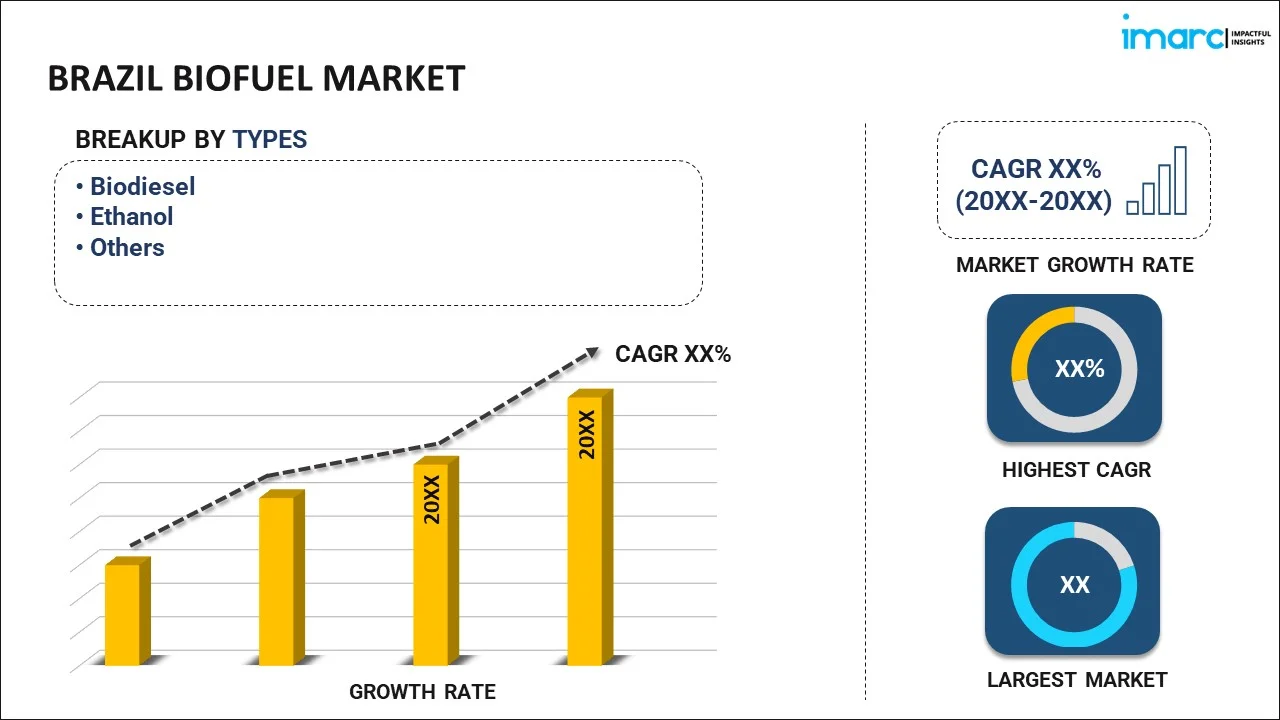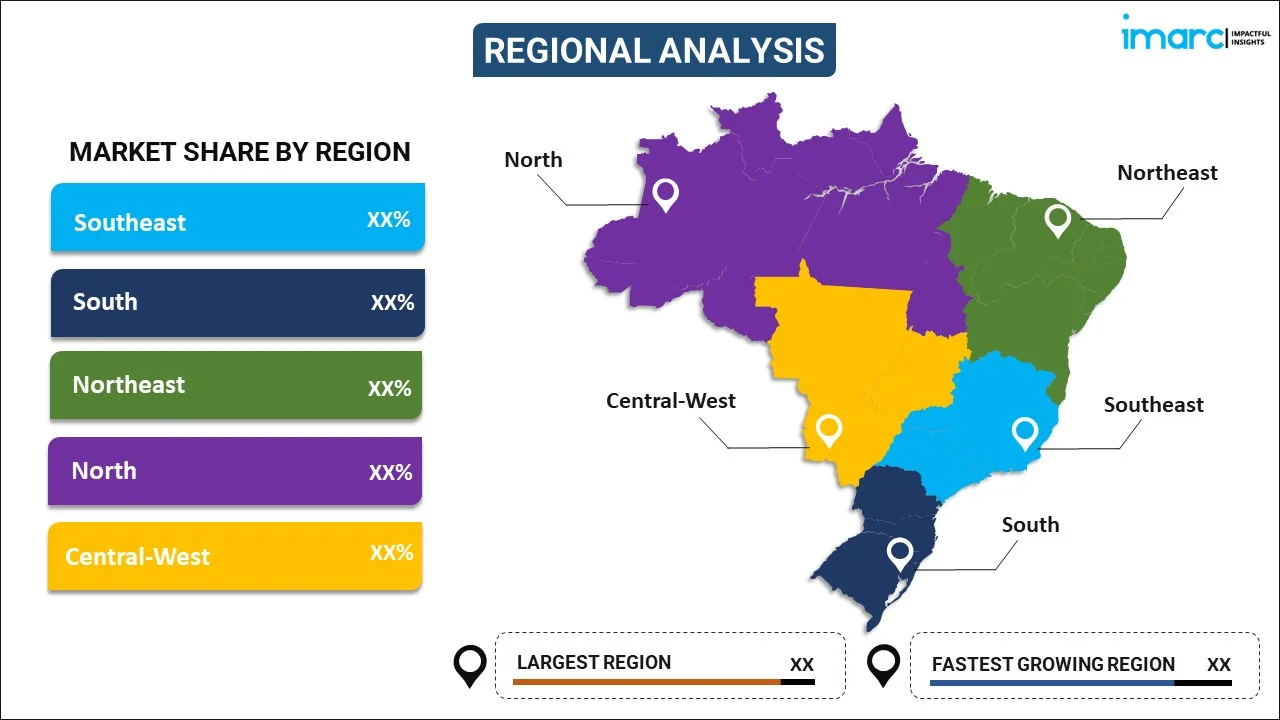
Brazil Biofuel Market Report by Type (Biodiesel, Ethanol, and Others), Feedstock (Coarse Grain, Sugar Crop, Vegetable Oil, and Others), and Region 2026-2034
Market Overview:
Brazil biofuel market size reached USD 13.9 Billion in 2025. Looking forward, IMARC Group expects the market to reach USD 28.8 Billion by 2034, exhibiting a growth rate (CAGR) of 8.44% during 2026-2034. The market is witnessing significant growth, driven by rising demand for ethanol and biodiesel. Leading key players are expanding production capacities and investing in advanced biofuels. Supportive government policies and strong international demand for sustainable energy solutions further boost market demand and innovation across the country.
|
Report Attribute
|
Key Statistics
|
|---|---|
|
Base Year
|
2025 |
|
Forecast Years
|
2026-2034 |
|
Historical Years
|
2020-2025
|
| Market Size in 2025 | USD 13.9 Billion |
| Market Forecast in 2034 | USD 28.8 Billion |
| Market Growth Rate (2026-2034) | 8.44% |
Biofuel is a sustainable alternative to traditional fossil fuels derived from renewable biological sources such as plants, algae, or organic waste. One of the most common forms of biofuel is biodiesel, which is produced from vegetable oils or animal fats through a process called transesterification. Ethanol, derived from crops like corn or sugarcane, is another widely used biofuel. These biofuels can be blended with conventional gasoline or diesel, reducing the carbon footprint of vehicles and machinery. Biofuels are considered eco-friendly as they are carbon neutral. While they emit carbon dioxide when burned, the plants used in their production absorb an equivalent amount of carbon dioxide from the atmosphere during their growth, making the overall impact on greenhouse gas emissions minimal. This characteristic aligns biofuels with global efforts to combat climate change and reduce dependence on fossil fuels. In recent years, biofuels have gained prominence in Brazil due to its potential to mitigate environmental concerns associated with fossil fuels, such as greenhouse gas emissions and reliance on finite resources.
Brazil Biofuel Market Trends:
Increased Production of Ethanol
Dominant ethanol production, which makes it a global leader in biofuel output, represents one of the major factors increasing the overall Brazil biofuel market share. Ethanol production in Brazil is expanding to meet rising domestic and international demands, particularly in countries aiming to reduce carbon emissions. According to industry reports, in 2023, Brazil's ethanol production reached 35.4 billion liters, a 15.5% increase from the previous year. Anhydrous ethanol, blended with gasoline, rose by 13.5%, while hydrated ethanol, sold pure, increased by 16.8%. The Southern region led production with 17.2 billion liters, accounting for 48.5% of the total. Flex-fuel vehicles, which dominate Brazil’s automobile market, play a crucial role by giving consumers the flexibility to choose between ethanol and gasoline, thereby boosting local ethanol consumption. The government's supportive policies, including blending mandates and incentives, further strengthen this sector. These factors are collectively driving the Brazil biofuel market demand further across the country.
Expansion in Biodiesel Sector
Brazil's biodiesel sector is expanding rapidly, fueled by government mandates that progressively increase the biodiesel blend in diesel fuel. For instance, in March 2024, Brazil’s Chamber of Deputies approved a proposal to increase biodiesel blending in diesel to 20% by 2030, starting with 15% in 2025. The bill includes a traceability system for fuel quality and allows for higher voluntary biodiesel use. The initiative aims to enhance Brazil's energy transition and economic growth. The current blend target promotes the shift toward renewable energy, reducing the nation’s dependency on fossil fuels. This initiative aligns with Brazil's commitment to lowering carbon emissions and enhancing energy sustainability. The increased blend levels also create a robust demand for feedstocks, particularly soybeans, which are the primary source of biodiesel in Brazil.
Investment in Advanced Biofuels
Brazil is increasingly investing in advanced biofuels, particularly second-generation biofuels like cellulosic ethanol. For instance, in May 2024, Brazil's Raizen launched its second cellulosic ethanol plant in Sao Paulo, increasing its annual production capacity to 440 million liters. The 1.2 billion reais investment aims to meet the rising demand, especially from Europe. Raizen plans to open four more plants and may resume contract sales next year. Unlike traditional biofuels, cellulosic ethanol is produced from agricultural residues such as crop waste, rather than food crops. This approach enhances resource efficiency by utilizing waste materials and contributes to a more sustainable fuel production process. These biofuels help lower greenhouse gas emissions and reduce the environmental footprint of energy production, while also offering energy security. Brazil’s investment in these technologies positions the country as a leader in next-generation biofuel innovation. According to the Brazil biofuel market forecast, investments in advanced biofuels like cellulosic ethanol are expected to significantly increase the country’s market share in renewable energy.
Brazil Biofuel Market Segmentation:
IMARC Group provides an analysis of the key trends in each segment of the market, along with forecasts at the country level for 2026-2034. Our report has categorized the market based on type and feedstock.
Type Insights:

- Biodiesel
- Ethanol
- Others
The report has provided a detailed breakup and analysis of the market based on the type. This includes biodiesel, ethanol, and others.
Feedstock Insights:
- Coarse Grain
- Sugar Crop
- Vegetable Oil
- Others
A detailed breakup and analysis of the market based on the feedstock have also been provided in the report. This includes coarse grain, sugar crop, vegetable oil, and others.
Regional Insights:

- Southeast
- South
- Northeast
- North
- Central-West
The report has also provided a comprehensive analysis of all the major regional markets, which include Southeast, South, Northeast, North, and Central-West.
Competitive Landscape:
The market research report has also provided a comprehensive analysis of the competitive landscape in the market. Competitive analysis such as market structure, key player positioning, top winning strategies, competitive dashboard, and company evaluation quadrant has been covered in the report. Also, detailed profiles of all major companies have been provided.
Brazil Biofuel Market News:
- In October 2024, Brazilian company Grupo Potencial announced its plans to invest $108.86 million to expand biodiesel production at its Parana facility, aiming to make it the world’s largest producer of soy oil-based biodiesel. This expansion will increase annual output from 900 million to 1.62 billion liters.
- In August 2024, Brazil government allocated R$6 billion (approximately $1.09 billion) to promote the development of biorefineries for sustainable aviation fuel (SAF) and marine biofuels. The initiative sees joint contributions from the National Bank for Economic and Social Development (BNDES) and FINEP. Brazilian companies focused on fuel production or R&D are invited to submit proposals for funding, which can be used for various related activities and expenses.
- In June 2024, Mubadala Capital announced its plans to invest $13.5 billion in Brazil's biofuels sector over the next decade. The investment includes a project by Acelen to produce biofuels and the conversion of a Petrobras refinery in Bahia.
Brazil Biofuel Market Report Coverage:
| Report Features | Details |
|---|---|
| Base Year of the Analysis | 2025 |
| Historical Period | 2020-2025 |
| Forecast Period | 2026-2034 |
| Units | Billion USD |
| Scope of the Report | Exploration of Historical and Forecast Trends, Industry Catalysts and Challenges, Segment-Wise Historical and Predictive Market Assessment:
|
| Types Covered | Biodiesel, Ethanol, Others |
| Feedstocks Covered | Coarse Grain, Sugar Crop, Vegetable Oil, Others |
| Regions Covered | Southeast, South, Northeast, North, Central-West |
| Customization Scope | 10% Free Customization |
| Post-Sale Analyst Support | 10-12 Weeks |
| Delivery Format | PDF and Excel through Email (We can also provide the editable version of the report in PPT/Word format on special request) |
Key Questions Answered in This Report:
- How has the Brazil biofuel market performed so far and how will it perform in the coming years?
- What has been the impact of COVID-19 on the Brazil biofuel market?
- What is the breakup of the Brazil biofuel market on the basis of type?
- What is the breakup of the Brazil biofuel market on the basis of feedstock?
- What are the various stages in the value chain of the Brazil biofuel market?
- What are the key driving factors and challenges in the Brazil biofuel?
- What is the structure of the Brazil biofuel market and who are the key players?
- What is the degree of competition in the Brazil biofuel market?
Key Benefits for Stakeholders:
- IMARC’s industry report offers a comprehensive quantitative analysis of various market segments, historical and current market trends, market forecasts, and dynamics of the Brazil biofuel market from 2020-2034.
- The research report provides the latest information on the market drivers, challenges, and opportunities in the Brazil biofuel market.
- Porter's five forces analysis assist stakeholders in assessing the impact of new entrants, competitive rivalry, supplier power, buyer power, and the threat of substitution. It helps stakeholders to analyze the level of competition within the Brazil biofuel industry and its attractiveness.
- Competitive landscape allows stakeholders to understand their competitive environment and provides an insight into the current positions of key players in the market.
Need more help?
- Speak to our experienced analysts for insights on the current market scenarios.
- Include additional segments and countries to customize the report as per your requirement.
- Gain an unparalleled competitive advantage in your domain by understanding how to utilize the report and positively impacting your operations and revenue.
- For further assistance, please connect with our analysts.
 Request Customization
Request Customization
 Speak to an Analyst
Speak to an Analyst
 Request Brochure
Request Brochure
 Inquire Before Buying
Inquire Before Buying




.webp)




.webp)












